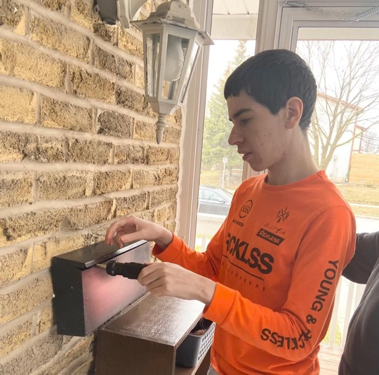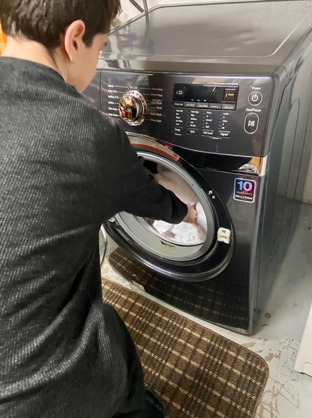The die is cast. Distance learning is the new reality. As a high school teacher, it presents a great learning curve for many of us, but, as a high school special education teacher, it's even more challenging. I’m Amrapali Sharma and, as a special educator, I follow an IEP (individualized education program) that is drawn up for each student, keeping in mind their current abilities, and including some reasonable goals we want them to work towards. Given what we’re now facing, a lot of that has gotten more challenging.
Last year, a new A4 Curriculum was introduced in my school as we recognized the need for improving the employability skills of our special education students. If that was something that was not realistic due to the skill sets the students possessed, then we’d focus on improving their life skills so that they could function with minimal assistance when they leave the school at 21 years old.
Our life skills program revolves around teaching students important life skills, like doing laundry, cleaning, cooking, using a microwave, grocery shopping, organizing a kitchen, and managing the class store and school food bank among other things. While it was fairly easy to work on these goals while school was in session, it’s become very difficult to accomplish them in a long distance environment.

Apart from connecting with parents on a regular basis through phone calls and our class app, I used to send them regular pictures of students participating in the various activities during the course of the day so that they could see their growth. Now, with schools closed, the tables have turned and they’re sending me pictures of the various ways students are helping around the house!
I had sent them a daily and weekly schedule of activities that they could help their parents with over the course of the day. A few parents are trying to follow that schedule as best as they can with their personal circumstances, which is really all I can ask, but it certainly is tough.
For example, one student is living in a motel room that was arranged for the family by a shelter. They had been staying with a family friend, who found it too difficult to house them any longer. This was in late February and, as I got things moving with the help of an amazing facilitator who got the family connected with the organization, this offered them a temporary solution.
The only piece of tech that this family has is the mother’s phone. Thankfully, I work with an amazing administrator and, with help from the school board, this family and two others have now received Chromebooks. The mom, however, did not let her circumstances stand in the way of her son’s learning. She gets him to help her with simple tasks like making the bed, putting on a pillow cover, and practicing his writing.
Meanwhile, the admin and I are making sure that they get bags of food and information about food banks in the area to help sustain them. This particular case involves a single parent with no job, a younger sibling, and no technology. Personal circumstances are playing a big role, but the mom is persevering as best as she can. I’ve seen this trend happening a lot as parents are working closely with their children to make sure the learning continues in one way or another.

There are also a couple of non-verbal students that I have, who probably don’t even understand why their schedule has changed so drastically. One of them has a younger sibling at home, who takes up most of the mom’s time and we know it’s a lot to ask of this mother to find the time and the motivation to teach this student. I keep sharing various activities and websites and my amazing TA staff shares recipes of things we’ve made in school so the kids can still participate in some familiar and meaningful activities at home.
One of my TA’s has created a simple exercise schedule that the students can follow along with at home, but they are all one-on-one, so the students often need help. The struggles and personal circumstances of the parents are very real. Some have been laid off. Some have had their work hours cut down. Some don’t have access to any technology and, for one family in particular, English is not the language spoken at home.
For regular students, this distance learning experiment might be working out somewhat, but, for my students with learning differences, it has certainly been challenging. Apart from the fact that we are now expecting busy parents to carry the mantle for teachers, help break down the instructions that the teachers are sending, and then teach, there is virtually no respite for them.
When the special education students were coming to our school, they were not only engaging in meaningful activities based on their skills, but their parents were also getting that much-needed respite. Now, that respite is a distant dream for a lot of them.
The students don’t understand why they can’t go out. The parents are afraid and tired with a lack of resources and support. When you have to worry about which food bank you have to go to next, curriculum is the last thing on your mind.
As a teacher, I am trying to help them as best I can. This has included sending them online resources, arranging for food drop-offs, getting them information about food banks, CERB, and Child Benefit. For others, it is just a brief conversation. I listen to their stories and offer them some comfort and empathy, which is one of the most needed commodities right now.
I will not give up on them and continue to support these students and their families as best as I can. Technology and curriculum are only as effective as the teacher dispensing it. Screens can never replace a teacher. These special students learn through a combination of all five senses and mostly by watching, copying, and practicing over and over until the skill is mastered. The human connection is what brings the learning to life and hopefully we can get back to that sooner rather than later.
About Amrapali Sharma:
I am a teacher at the Bramalea Secondary School in Brampton, Ontario, working specifically in the district’s Developmental Disabilities program. I recently received the “Award of Distinction for 2020” from the Peel District School Board and have over 23 years of teaching experience with 15 of those years spent working with special education students. I do not profess to be an expert, but I am observing and learning every day from the students and my colleagues, continuing to aim for “heart-gogy.” All learning must start from the heart so that it can reach the heart. Then, the mind shall follow.



